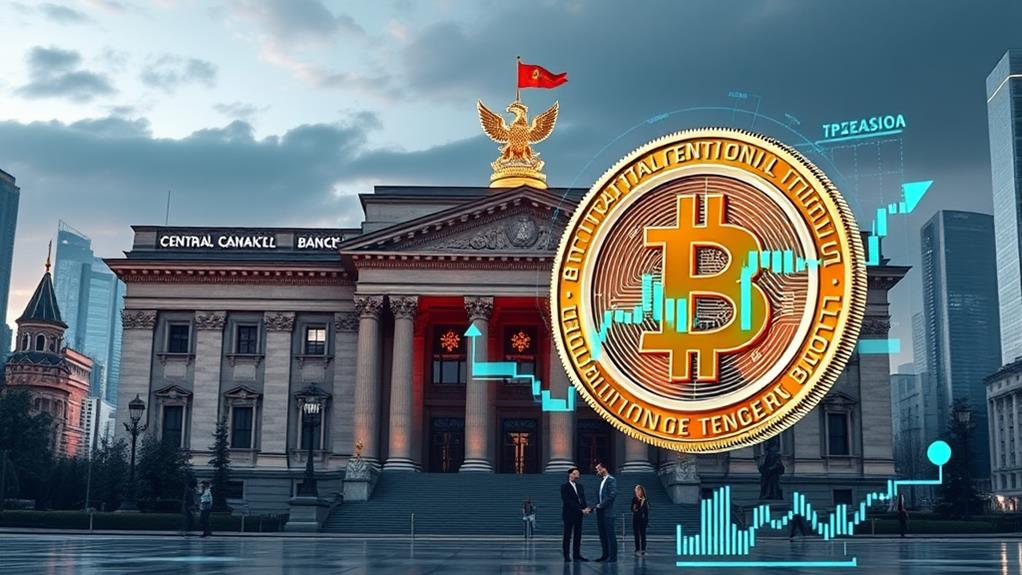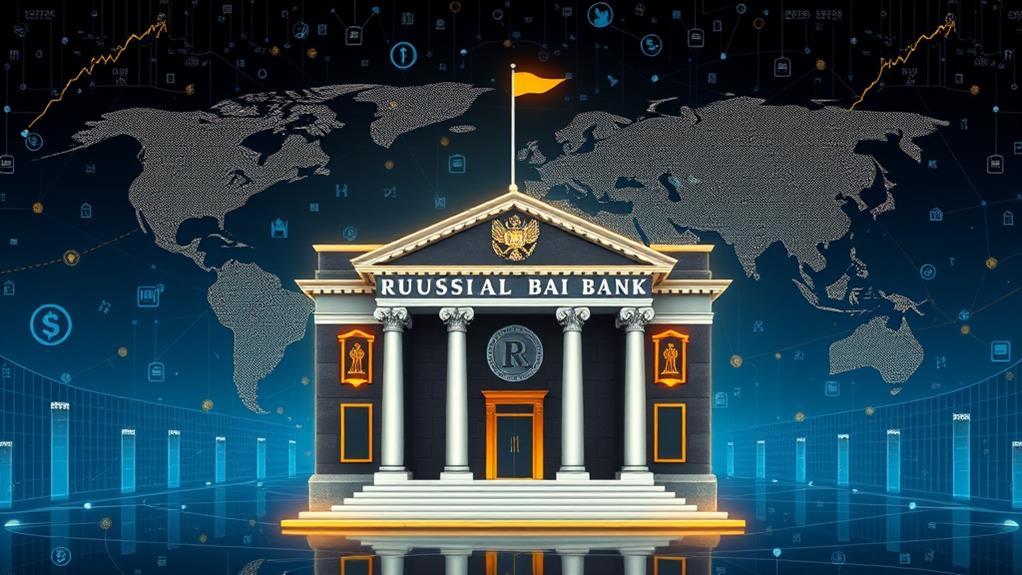
In a significant policy shift, Russia's Central Bank is now embracing cryptocurrencies for qualified investors. This move comes after a prolonged period of cautious regulation, aimed at balancing market stability with the burgeoning demand for digital assets. Strict regulations guarantee that only investors with significant financial expertise and high-risk tolerance can participate in these markets, mitigating risks such as fraud and money laundering. These regulatory frameworks are designed to foster a secure investment environment, attract foreign investment, and bolster economic growth. As Russia integrates digital currencies into its financial system, understanding the broader implications could offer valuable insights.
Table of Contents
Current Crypto Landscape

The journey towards crypto legalization in Russia has been long and intricate, marked by a historically cautious stance from the Central Bank of Russia. For years, the central bank has prioritized market stability over rapid innovation, imposing stringent crypto regulations to mitigate financial risks. However, recent developments signal a potential paradigm shift as proposed amendments aim to integrate digital currencies into the broader financial ecosystem. These efforts focus on balancing the burgeoning demand for digital assets with the overarching need to safeguard national financial stability. By cautiously maneuvering through this complex landscape, Russia hopes to harness the benefits of the crypto market while maintaining robust regulatory oversight, ensuring that financial freedom does not come at the expense of systemic security.
Qualified Investors Defined
What criteria distinguish particularly qualified investors within Russia's evolving crypto landscape? In the context of recent amendments, particularly qualified investors are defined by their extensive experience and high-risk tolerance in handling digital assets. These investors, often institutions or individuals with significant financial acumen, are subject to specific crypto regulations aimed at mitigating risks such as fraud and money laundering. By confining cross-border crypto transactions to this group, the Central Bank of Russia aims to enhance investor protections while maintaining financial stability. This strategic approach guarantees that only those with the requisite expertise and resources can navigate the complex and volatile crypto market, thereby fostering a safer investment environment within the rapidly evolving regulatory framework.
Benefits of Legalization

Legalizing cross-border crypto deals presents several notable benefits for Russia's financial landscape. By embracing these transactions, qualified investors gain access to enhanced investment diversification, allowing them to spread risk across a burgeoning asset class. The establishment of robust regulatory frameworks guarantees that these transactions occur within a controlled environment, minimizing the potential for fraudulent activities. Additionally, the regulated nature of these deals can attract foreign investments, contributing to economic growth and stability. This legal recognition of crypto transactions also fosters a sense of security and trust among market participants, encouraging further engagement. Ultimately, these benefits pave the way for a more dynamic and resilient financial system, aligned with the desires of freedom-seeking investors.
Challenges and Considerations
Maneuvering the complexities of crypto legalization in Russia requires meticulous attention to regulatory clarity to prevent legal ambiguities. The Central Bank must address regulatory ambiguity to guarantee robust and transparent frameworks that support investor confidence and security. Additionally, establishing the technological requirements necessary for secure and efficient crypto transactions is paramount. This involves significant investment in advanced cybersecurity measures and infrastructure to handle the dynamic nature of digital currencies. The Central Bank's vigilant oversight is essential to monitor and regulate these activities, maintaining financial stability during the shift. Implementation challenges, such as aligning with international standards and overcoming initial resistance, must be meticulously managed to uphold the integrity of Russia's financial system and foster an environment conducive to freedom and innovation.
Global Impact

As Russia shifts its stance on cryptocurrency, the global impact of its policies is poised to be significant. By embracing crypto for investors, Russia could influence international regulations, potentially setting new standards that other nations might follow. This move could trigger a ripple effect in market dynamics, encouraging countries to revise their own crypto frameworks and fostering a more cohesive global regulatory environment. The economic stature of Russia adds weight to its decisions, making this shift a pivotal moment in the crypto landscape. Investors worldwide, desiring freedom and innovation, could benefit from a more regulated and secure market, driving further adoption and integration of digital currencies on an international scale.
Conclusion
The Central Bank of Russia's shift towards embracing digital currencies signifies a pivotal moment in the nation's financial landscape. Introducing qualified investors with high-risk appetites aims to balance market opportunities and financial stability. Significantly, legalizing cross-border crypto transactions could enhance investment diversity and attract foreign capital. According to recent data, the global cryptocurrency market is projected to reach $1.08 trillion by 2027, highlighting the sector's growing prominence and Russia's potential influence on global regulatory practices.







